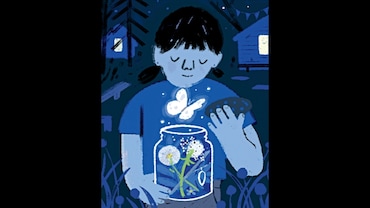- HOME
- /
- True Stories
- /
- My Story
- /
Granny's Lost Gold
The ride to her village brought back a flood of memories-and a small fortune.

IN 1965, when India and Pakistan went to war for the second time, I was 16 years old and living in Amritsar with my three siblings, parents and grandmother. Sirens often went off during air raids by Pakistani fighter jets and people rushed out of their houses and jumped into the nearby trenches. There would be a complete blackout in the city on these nights.
Once, the village of Chheharta Sahib near Amritsar was badly hit by the Pakistan Air Force, leaving over a 100 people dead. We remained glued to the radio to get the latest updates on the war. When we heard that the Indian army had foiled the Pakistan Army's attack to capture Amritsar and destroyed its famed Patton tanks near Khem Karan, some five kilometres from Amritsar, we were jubilant. The Pakistanis had lost so many of their tanks in the battle that the place got to be known as Patton Nagar!
"Why has Pakistan forced this war upon us?" my grandmother often lamented. "It's peace that would bring prosperity to both nations, not bloodshed." A feisty Punjabi woman in her late fifties, she was born in a small village in Lahore in undivided India. My grandfather had passed away in the prime of his youth and, following Partition, my widowed grandmother had settled in Majitha, Amritsar, with some of our relatives. She had raised her two children-my father and my aunt-on her meagre pension, savings and by keeping livestock. She mostly wore a white salwar suit and dupatta and often told us about the happy life she had seen in her village situated just three kilometres across the border-before the horrors of Partition had taken it all away.
Gaining an upper hand in the war, the Indian Army advanced to Ichhogil canal, on the outskirts of Lahore, and the captured territory came under the control of the Punjab Armed Police (PAP).
When my grandmother learnt about this on the radio, she expressed her desire to go to the village where she had spent her childhood. Her desire was reinforced when we heard that many people living near the border had been visiting the occupied territory. "Kamal," she implored me, "take me to the house where I was born. I've been dreaming of it for almost 18 years-since Partition."
"It is dangerous bibi," I explained to her, "there could be landmines and even enemy snipers."
"Aren't a lot of people visiting the captured areas?" her eyes lit up with excitement. "My village is not far from the border."
Since I was the more adventurous of my two brothers, it didn't take her long to convince me. The ceasefire was declared on 23 September 1965 and a few days later, on a crisp, cool morning, I helped my grandmother sit pillion on my bicycle and started off towards her village. Giving us company were two family friends in their early twenties-also on bicycles.
We rode on the NH1, the road to Lahore, until Attari, the last Indian village near the Indo-Pak border.After cycling for about three hours, we turned towards the railway tracks just before the Wagah border. Riding beside the railway tracks, we entered the occupied Pakistani territory praying that we didn't run into any danger. On my grandmother's suggestion, we turned right from the tracks and soon reached a makeshift PAP check-post. We saluted the soldiers and presented fruits to them. "Where are you going?" an officer asked us. When I explained our purpose to him, he allowed us to continue.
"Come back before it gets dark," he called as we rode away. For the rest of the journey, we cycled on mud tracks with my grandmother guiding us to her village. "Take a left turn from that well," she said enthusiastically as the path ahead of us veered off in three different directions.
Soon after, we found her small hamlet. It was now a ghost village with about 200 kutcha houses and no signs of life. The Pakistanis had fled their homes taking their cattle and valuables with them. My grandmother had no problem in leading us to her house through a maze of narrow lanes and by-lanes. Her house was still there but in a wretched state. Its doors were unlocked, and save for a few string cots and odd clothes, the house was empty.
"During Partition," my grandmother explained to us, "people had to leave their houses on very short notice, with hardly any time to collect all their valuables." My grandmother looked at the mud floor and wooden rafters on the ceiling, moving from one room to another on her own, touching the doors and windows fondly. She was happy and her eyes clouded up with fond memories. After crossing one of the rooms, bibi came back as if recollecting something. I noticed that she was gazing intently at a rectangular niche in a wall. Kneeling down, she reached a small cavity in the niche. When she pulled her hand back, there was a small tin in her fingers. As she opened its lid, we were surprised to notice that it was stuffed with gold ornaments. Throwing away the tin, she wrapped the gold in her dupatta. "It's my family's jewellery," her eyes gleamed with pride, "in their hurry to escape, my family forgot to pick it up. Who'd have imagined that I would come back to reclaim it almost two decades later!"
"Follow me," she said, "we could find some more in another room." Wonderstruck, we walked behind her. "There used to be a wall here, which had a small safe where we kept our valuables," she sighed, "but the new occupants have renovated the house and the wall has been demolished." Then she moved towards her left. Placing her hand on another mud wall, she asked us: "Could you remove some clay from this portion?"
"What for?" our friends asked her.
"Do as I tell you," bibi insisted.
One of my friends began scraping the mud wall with a small knife we were carrying for our safety. To our bewilderment, silver coins started falling to the ground from the wall. Some 50-odd coins! Wiping them clean, my grandmother also wrapped them into her dupatta. Realizing that she would not be able to come again, she threw one last glance around and had to wrench herself away from her house. As all of us trooped out, I noticed there were tears in her eyes. It was getting dark and we pedalled quickly towards the border, praying we would return safely. We met the PAP personnel at the check-post and thanked them profusely for allowing my grandmother to visit her home. Soon we were riding back to Amritsar on the NH1. I was taken aback when our two friends made me halt by blocking the path with their bicycles. "Get down," they ordered.
"What for?" I asked unable to figure out why they were talking to me in a menacing tone.
"You have to give half your jewellery and silver coins to us."
"Why?" screamed my grandmother, "they're my family's valuables.""Didn't we accompany you across the border?" one of them smiled ominously.
Soon the pestering became threaten-ing and then aggressive. Granny gave in. It was dark and there was nobody around. They took away a major portion of the valuables and left us with only a small part. Soon they sped away out of sight, leaving me and my granny all alone on the road.
I was hoping that once we reached Amritsar, we would get back our valuables following the intervention of family elders, but that never happened. Anyway, the ornaments we got to keep saw us through my father's illness and helped get my sister married. Five years later, in 1970, I joined the Army as an officer, but never had the opportunity or inclination to contact our 'family friends' and ask them to return our gold and silver.
A few months later, my grandmother passed away in Amritsar. But, while she was alive she often recounted to my relatives how I had taken her across the border. "It was the best journey of my life-a pilgrimage, rather," she would say. "It wouldn't have been possible without my Shravan Kumar*."
Soon after being commissioned in the Army, Col Ajit Kamal (retd) saw action in the 1971 War. He was decorated with the Sena Medal for his gallantry in a rescue operation during the 1979 landslides in Garhwal. Now, 65, he lives in Mhow, MP.
* A mythological figure from the Ramayana, Shravan Kumar carried his old, blind parents on a pilgrimage in baskets slung across his shoulder.






